|

photo - mw
_______________________
Draft L: Scholia and Restlessness
Rachel Blau DuPlessis
(....)
Who are you? What do you do it for? for natural light,
to keep these listeners awake, plus dead and time.
All local and all destroyed must speak accurately
how the man stood on the margin of edge
larbage dreams with dusk, cardbore and ash.
Why scan, capture, index, interlink this trash?
"For your good health, Barrel Picking is prohibited."
Why not leave well enough alone?
A play within the play, he hove sprechstimme
fragments in half an anguage, ghostily selected
strung together as if continuous text,
hallucination's vantage keying incantation sentinel,
with restless regard "not from a place on which to fix
but from a crossing of that place, a crossing of that crossing."
He began to experience difficulties with reality;
for him each human soul remained a human soul.
But it is hard to act without shame, though
this be always true, for who it act it in your name?
The dream of turning the key in the lock as the wind in the door
moaned and the crow flew with its yard-wide wingspan
into the pear tree finding the open place. Now what?
He asked me, Why do you do what you do?
...(more)
_______________________
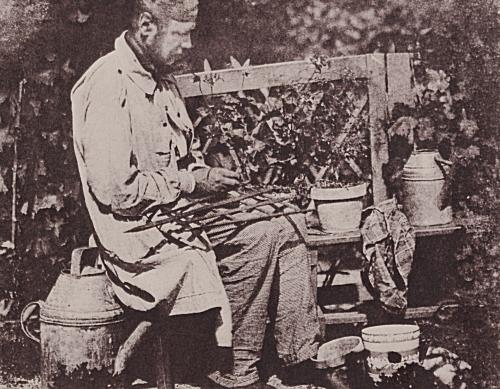
self portrait
1846
Hippolyte Bayard
_______________________
Indigenous Networks
Rethinking Print Culture through Early American Media
Matt Cohen
The logical starting point for a book historian's investigation into Native American communications systems, one assumes, would be the Cherokee Phoenix editors' adoption of Sequoyah's syllabary to print the first Native American newspaper in 1828, which appeared just as "Indians" were being deemed "domestic dependent nations" by the U.S. Supreme Court. Instead, Matt Cohen's The Networked Wilderness: Communicating in Early New England (2009) focuses on the era before the first printing press arrived in New England. Common-place asked Cohen: What do we learn by examining this earlier moment?
Sequoyah is a perfect place to begin! That history, like most, will carry you backwards, not just forwards; east, and not just west. The adoption into print of Sequoyah's syllabary changed things, not merely because of its role in its political moment and its persistence down to the present, but in its philosophical riposte to claims, made long before the 1820s and long after, for the superiority of alphabetic literacy. The syllabary is sonic, not alphabetical, in its epistemology; it was adopted and learned rapidly; and it has played an important role in intercultural politics ever since it was accepted by Cherokee people. But did the print that ensued create a "culture" of print? And if so, was it, or has it become, truly "independent," escaping the structure of domination that Justice Marshall's declaration of Indian tribes as "domestic dependent nations" helped impose? The alternative to assumptions about a dependent print culture may not be to imagine independence, but rather to embrace the complex ways our worlds are built upon webs of communicative habits and protocols. A step in counteracting the logic of dependency is to shift the analytical lens away from what has gone under the label of "print culture." By mindfully bypassing narratives in which print is the pivot point, we get to ask questions that wind up telling us more and more interesting things, both about Early Americans (be they Native or English) and about how communication actually works in historically specific contexts.
One answer, then, to the question "Why turn to the early moment?" is simple: It alienates us from our own systems, allowing us to see things about communications technologies we didn't notice before, and to see them as historically specific. But at the same time, it shows hidden genealogies or, just as importantly, resurgences, folds in time, rather than a linear forward march, in the ways humans have handled confrontations with radically new communications technologies and protocols. The old story was that human communications systems kept improving with time, and civilization was knowable in part by its progression through ever more "advanced" stages, marked by "better" media technologies....(more)
Common - Place
VOL. 12 · NO. 02 · January 2012
_______________________
Everything You Always Wanted to Know About Lawful Access, But Were (Understandably) Afraid To Ask
Michael Geist
Public Safety Minister Vic Toews is expected to introduce lawful access legislation tomorrow in the House of Commons. An Act to enact the Investigating and Preventing Criminal Electronic Communications Act and to amend the Criminal Code and others Acts, likely to be Bill C-30, will mark the return of lawful access in a single legislative package. While it is certainly possible for a surprise, the bill is expected to largely mirror the last lawful access bills (C-50, 51, and 52) that died on the order paper with the election last spring.
This long post tries to address many of the most common questions and misconceptions about lawful access in Canada. The questions and answers are:
What is lawful access?
What is Bill C-30 likely to contain?
Isn't ISP customer name and address information similar to phone book data that is readily available to the public without privacy concerns? (first prong)
Isn't the mandatory disclosure of ISP customer information necessary for police investigations? (first prong)
Didn't former Public Safety Minister Stockwell Day pledge not to introduce mandatory disclosure of ISP customer information without court oversight? (first prong)
Who pays for the surveillance infrastructure required by lawful access? (second prong)
Does lawful access create a new regulatory framework for the Internet? (second prong)
Does lawful access create new police powers? (third prong)
Does opposing lawful access mean questioning the integrity of law enforcement?
Don't other countries have the same lawful access rules as those found in Canada?
What do Canada's privacy commissioners think about lawful access?
Are these lawful access proposal constitutional?
Does the government seem somewhat inconsistent on its crime and privacy policies?
Where can I learn more about lawful access and what can I do?
...(more)
_______________________

Happy Birthday Mother
photo - mw

photo - mw
_______________________
Chronophrenia
Seth Abramson
The Offending Adam
(....)
VI.
At the end of travelling
I wear the road. Within my skin it is bad.
It’s worse without—
the particulates of being nowhere entirely.
It spans from Boston to winterlit Alaska
on a single lane with drops to the death
over both shoulders.
I walk on years, I touch with all the worst
minutes. I mean it takes its single traveler
to an outhouse on a black prairie, I mean
there’s one chicken left, one purblind pig,
and they can’t be killed
or not by me. On Sunday a doctor comes
and says not to worry, he will only open
along the edges. He finds them quick. He
has an uncertain nose, he learns in blood,
he reaches through blood and he’s satiated.
What I say to him slinks down his smock.
So the road is the crown
of your head, you are sent inside by sunlight
he says. That burns it too, you saying that
Doctor. But it’s true, at the end of travelling
I am the largest
silhouette, everything behind me I colon
into a list of what I’m made of. Up ahead
the doctor waits again in his red armchair.
I hold the light above him as he reads me.
I have left more behind
than is ahead, I’m close to it now. Not so,
he says, it’s the shoulder you hang from—
twelve hours from Boston and Alaska both.
...(more)
Seth Abramson at the Poetry Foundation_______________________

photo - mw
_______________________
Short Voyages to the Land of the People
Jacques Rancière
translated by James B. Swenson
mediafire pdf
from the introduction
(....)
In this book will be found a few voyages chosen by chance or affinity, a few brief encounters or missed appointments that are part of the archaeology of this politics: voyages of missionaries insearch of the people of the future.....
(....)
Under their gaze, to the rythm of their steps, the images of the new world come into being and pass away. This is not simply because the foreigner comes to know the language or because experience disillusions his gaze. Lucidity only provides another way of drawing the landscape, of creating an agreement between its lines and shadows and the habits of belief. It is not because the aridity of stone and the cold of the tomb impose themselves where, before, the flowers of the festive people and the happy future had been offered. It is also because the foreigner — the naif, it will be said, he who is not yet informed — persists in the curiosity of his gaze, displaces his angle of vision, reworks the first way of putting together words and images, undoes the certainties of place, and thereby reawakens the power present in each of us to become a foreigner on the map of places and paths generally known as reality. ....
_______________________
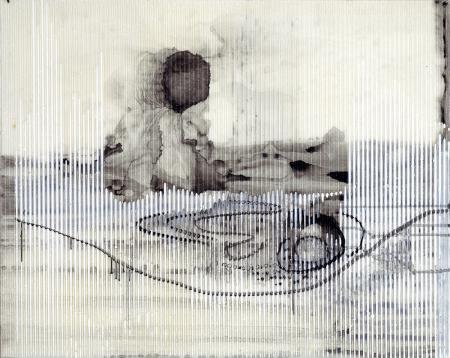
A conflict that has long been resolved
2007
Sigmar Polke
b. Feb. 13, 1941
_______________________
I Am Corrupted
Seth Abramson
Northern Poetry Review
It’s true there’s no “purity” (of any kind) to be had in the poetry community, but that’s little surprise, as there’s no purity to be had anywhere, really. None of us are clean. I worked in the criminal justice system (as a public defender) for years, and I considered the work I did a noble calling, but not everything I did associated with that calling was noble. Some of the things I did I would classify as “tiny corruptions” -- gradually widening impurities of the spirit which must be indulged to live sustainably in a rarefied environment for a long period of time. I could accept certain of those impurities because the work I did every single day was work done on behalf of others; I wasn’t making a lot of money, I wasn’t accruing any professional prestige, I wasn’t necessarily even treated all that well by many of those (for instance, judges and prosecutors and family members of clients) I had to deal with on a regular basis, but fundamentally I could sacrifice a piece of my spirit if I knew I was doing it, in the long run, to help secure the dignity rights of others.
We’re poets; very few people read our work and even less care about it, we do very little to directly impact the political direction of our communities or the individual rights and opportunities enjoyed by our fellow citizens. So when we allow widening impurities of the spirit to work themselves upon and through us, it’s not entirely clear to me how we (or how I) can justify it.
(....)
... if we don’t at least mourn the tiny corruptions that have beset us, we are doomed to a) accept those which really we need not accept in order to make Art, and b) lose that part of the self which is so often incapable of stopping a bad thing from happening but at least “holds in reserve” a piece of what’s good in us by regretting the fact that a bad thing is going to be done or said or permitted one way or another....(more)
_______________________
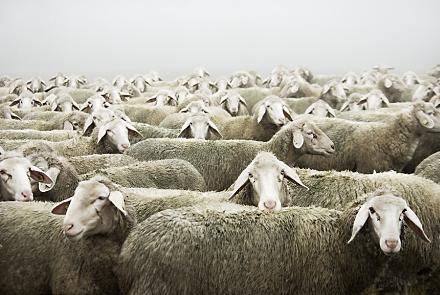
Carmen Spitznagel
1 2 3
_______________________
The Storytellers of Empire
Kamila Shamsie
guernica
(....)
I grew up in Pakistan with two Americas. One was the America of To Kill a Mockingbird and Ferris Bueller’s Day Off, of the young Michael Jackson and Laura Ingalls Wilder, of Charlie’s Angels and John McEnroe and Rob Lowe’s blue eyes. Of Martin Luther King and Snoopy. That America was exuberance and possibility.
But there was another that I lived with. The America which cozied up to Pakistan’s military dictator, Zia-ul-Haq, because it served its own interests in Afghanistan to do so. This America threw vast amounts of money at Zia, propping up his rule, strengthening his military, turning a blind eye to its nuclear program, working with him to promote the war in Afghanistan as a jihad for all Muslims rather than a territorial matter between Afghans and Soviets; this America spoke eloquently of the Afghan people’s right to freedom and self-determination but decided it was an internal matter when Zia’s government cracked down on pro-democracy protestors in Pakistan, or when he instituted public floggings and hangings, or when he passed a law which made it possible for a woman who had been raped to be stoned to death for adultery.
How to reconcile these two Americas? I didn’t even try. It was a country I always looked at with one eye shut. With my left eye I saw the America of John Hersey; with my right eye I saw the America of the two atom bombs. This one-eyed seeing was easy enough from a distance. But then I came to America as an undergraduate and realized that with a few honorable exceptions, all of America looked at America with one eye shut....(more)
_______________________
Political Prisoners in the North American Homeland
J. B. Gerald
global research
The legal systems of Canada and the U.S. make no separate recognition of "political prisoners." This encourages police malfeasance and a bending of the legal system to cope with political protest in the same manner as crimes of self-interest. Confused by the difference, society prefers to sort its members into "good" and "bad". As totalitarian controls by government increase, more people will probably assert their humanity and the numbers of political prisoners will grow, but in the process criminalize entire groups of people who have strong convictions, integrity, loyalty to community, and care deeply about what happens to their country, society, humanity.
_______________________
5 Right-Wing Governors Gutting Schools to Fund Prisons, Tax Breaks for the Rich...And a Bible Theme Park
_______________________

photo - mw
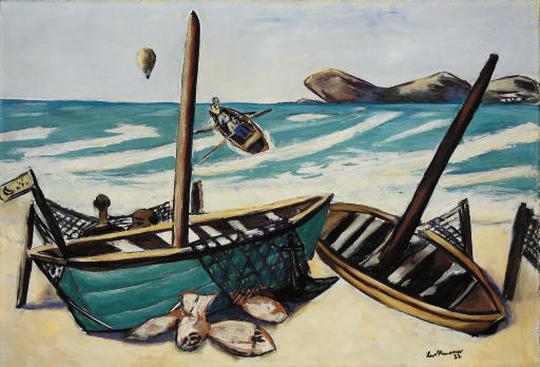
Coastal Landscape with Balloon
Max Beckmann
b. Feb. 12, 1884
_______________________
Rae Armantrout: Four New Poems
presented by Jerome Rothenberg
FORMAL CONSTRAINTS
Now the poem
is saying
what it is forced to say
by its history, its form
thus pleasing the reader
who knows he can trust it
without being obliged
to regard
any statements it may make
as accurate
or “true.”
The poem is ridding itself
and us
of the burden
of abstraction –
a valuable service.
Still
a question arises
as to how
to dispose of the poem
once this divestment
is complete.
...(more)
Rae Armantrout at the Poetry Foundation
_______________________

Journey on the Fish
1933
Max Beckmann
weimarart
_______________________
Barthes after Barthes
Mourning, fiction and love: the final thoughts of a great writer
Sylvère Lotringer
frieze
We thought we knew everything about Roland Barthes – the way he managed to glide effortlessly across the entire French intellectual landscape, in turn embracing semiotics and dismissing it, dissolving the author in the text and then bringing out the secret of its pleasure, all the while keeping his distance and the singularity of his style. Closely associated with the avant-garde literary magazine Tel Quel, but unabashedly classical in his tastes, Barthes never wavered from his obsession with writing, even after philosophy in France superseded literature and, in turn, the new media culture dismissed them both by imposing its own language and reality. Right to the very end Barthes remained the quintessential French homme de lettres and literary oracle. As he himself liked to say, he was the ‘rear guard’ of the avant-garde, and yet he always remained one step ahead of himself. ...(more)
frieze
_______________________

AGregory Halpern
Hope In The Dark: Gregory Halpern’s A
the great leap sideways
_______________________
Book review: 'Distrust That Particular Flavor' by William Gibson
Margaret Wappler
(....)
Herein lies one of Gibson's most incisive gifts: his appreciation for the undersung, the copy, and how it can proliferate. Not the original, because as recontextualization, mash-ups, memes and other clever varietals of simulacra have possibly forever detonated our sense of originality and authenticity, the first is simply the start of an idea and not necessarily the best iteration, at that. Instead, Gibson knows that each copy adds more nuance to the object of our cultural fascination, imparted in its own weird, sometimes trashy but wholly individual code. The moments in "Distrust" where he translates the details of those codes are among the collection's best.
(....)
... as in his intro, Gibson often admits his failings in the notes after each piece. One of his descriptions of the Internet provides a clue to his working methodology. "It is like rummaging in the forefront of the collective global mind," he muses. "Somewhere, surely, there is a site that contains… everything we have lost?"
...(more)
_______________________
Every Year, JSTOR Turns Away 150 Million Attempts to Read Journal Articles
Locked in the Ivory Tower:
Why JSTOR Imprisons Academic Research
Laura McKenna
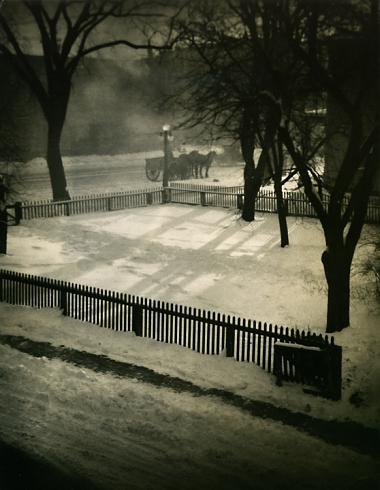
Middletown, Connecticut
1926
E. O. Hoppé
(1878-1972) _______________________
There is Language: Speech and Writing in Blanchot
Spurious
(....)
In a famous section in The Space of Literature, Blanchot takes up Levinas’s notion of the image (itself no doubt indebted to Blanchot’s fiction and criticism) in order to discuss the special mode of existence of the work of art. Along the way, he provides an example of the image in the relationship of the corpse to the living body, noting that the mourned deceased, before us as a cadaver ‘begins to resemble himself [ressembler à lui-même]’:
Himself: is this not an ill-chosen expression? Shouldn’t we say: the deceased resembles the person he was when he was alive? ‘Resembles himself’ is, however, correct. ‘Himself’ designates the impersonal being, distant and inaccessible, which resemblance, that it might be someone’s, draws toward the day.
‘[N]o man alive, in fact, bears any resemblance yet’, Blanchot writes.[vii] The friend we know through his many attributes – his gestures, his laughter, the tone of his voice – conceals a kind of presence which comes forward only after he dies.
Why does Blanchot write that the corpse resembles himself? Typically, a thing sustains itself as itself such that it can be experienced as if held together by our interest, our understanding; it is animated by our existence. What of the Other? For the most part, I understand her through the cultural categories through which my relation to others is mediated. You are my employee; I am your client; I know you as a service provider; you know me as a vendor of your company’s products – each time, it is a question of passing over the alterity of the Other in favour of relations which are instrumentally defined. That is to say, others are sustained in their coherency for me in terms of my understanding of their place in the world. What, though, about the corpse? Something in the corpse resists that power; which means, too, I cannot situate myself with respect to what happened as I approached the cadaver of my friend. To claim the corpse resembles itself is not to invoke a magical power it would possess but rather to indicate the way it withholds itself from my capacity to accommodate myself with respect to its differentiation. Here collapses into nowhere: the place I hold becomes uncertain; my hold on time falters.
...(more)
_______________________

Temple, London
1929
E. O. Hoppé
_______________________
"Something that stutters sincerely"
Contemporary poetry and the aesthetics of failure
Jennifer Moore
jacket2
(....)
The techniques of failure that Lin, Hart and others employ seem to reveal a “passive-aggressive … relation to meaning itself” in their simultaneous refutation of and attraction to authority and knowledge (although the poetry they produce, I hope I have shown, differs sharply from that of the post-avant). Indeed, the acts of resistance that Language writers performed mirror somewhat the acts of defiance we are seeing in this newly “sincere” aesthetic. However, the ways in which Hart, Lin, and others go about undermining meaning or conforming to “a grammar of experience” include the deliberate appropriation of sentimental gestures and, in some cases, indirect rejection of post-avant techniques. Hart’s and Lin’s poetry moves against this contemporary thrust by risking explicit self-expression and forms of knowledge through privileging modes of discourse that are essentially sentimental at their core. When these techniques are coupled with a failed content, Hart and Lin refuse the possibilities of the “successful” poem and instead embrace a poetics defined by its own failure.
These poets ask us to consider what the value is for such poetry in a culture which, as Christian Bök has shown us, views the literary arts as increasingly irrelevant. As Hart writes, “In poetry, one has to be open, willing, and able to fail every second. One has to court it, failure. Something’s at stake.” The idea of risking anything implies that what is being risked has a certain value; what’s at stake for these writers seems to be the possibility of human expression in any form. The hazards involved with the divulgence of interiority (embarrassment, sentimentality, readerly critique) turn it into a necessity in which one is required to risk the self in order to produce art. But this risk reaches beyond simply aesthetic concerns and extends to the world of actuality: art becomes a social obligation with the capability of “making ourselves, and everything, better.” What is at stake, then, is not just poetic assertions of real emotion and human value, but those emotions and values as lived in the world....(more)
_______________________

Enclosed Presbyterian Church
Derry, Pennsylvania
1926
E. O. Hoppé
_______________________
We Are All Precarious - On the Concept of the ‘Precariat’ and its Misuses
Richard Seymour
(....)In this article, I will argue that it is mistaken to treat the precariat as a class. Attempts to make it into a class are theoretically incoherent, and the facts of precarious labour and social precarity are misunderstood if boxed into an ‘emerging class’ thesis. This is important because class analyses underpin political strategies. In the case of the concept’s chief populariser, Standing, the analysis is bound up with a particular set of political articulations and strategic orientations that are more ‘Big Society’ than ‘Critique of the Gotha Programme’. I will argue that precarity exerts effects right up the chain of class strata, throughout the working class and into sections of the middle class, especially the petty bourgeoisie. The appellation ‘precariat’ thus works as a kind of populist interpellation, a claim I will explain in more detail in the conclusion. This interpellation, this ‘naming’, operates on a real antagonism. It is one that emerges between the ‘power bloc’ and the rest, particularly in the age of austerity. The precarity built into financialized accumulation was always pushed downward as far as possible. But it is affecting ever wider layers of people, such that only the capitalist class and a few sections of the middle class seem to be protected from it, their security purchased through our precarity. We should embrace the concept of the 'precariat' in this sense, and use it to help found a new, radical majoritarian politics with a distinctly anticapitalist core....(more)

Strumpshaw (evening)
Longing And Indifference
Mark Edwards via
_______________________
A Scrupulous Fidelity,
On Thomas Bernhard’s The Loser
Douglas Glover
(....)
Over and over, the reader senses that the narrator is thinking fast to prevent himself from thinking, his thoughts always implying an excess they dare not express (although the narrator does let slip many very clear pointers). The entire text is framed within an implied conflict—the narrator's resistance to a truth he cannot face—and this conflict propels the text forward with a mysterious urgency. The desperate, compulsive, and transparently self-serving if not delusional nature of the narrator's thoughts in turn motivates the stressed form characteristic of the prose. Hysteria motivates hyperbole. The mechanical elaborations of grammatical yoking are desperate attempts on the part of the narrator to appear logical and analytical even as he is constantly dropping into spiraling word repetitions, fugue stops, digressions, and self-revealing tirades.
But the disorder is only a semblance of disorder. It looks like a verbal torrent, the delirium of a madman, which of course it is meant to resemble in some superficial and theatrical sense, a deranged dramatic monologue (of thought), when in fact it is also artfully controlled, patterned and symmetrical (right down to the substandard Ehrbar piano the narrator plays as a child which returns at the end of the novel as the rented, “horribly untuned” Ehrbar Wertheimer plays for his travesty concert), art as symptom or symptom as art (repetition is a pattern of art and also of dream and neurosis), super-controlled (such an Austrian trait) and at the same time in tension with its own apparent haphazardness and compulsivity.
Hyperbole and absurdity subvert every aspect of Bernhard's novel; hyperbole is the constant marker for irony, the double sign that destroys the fictional facade of plausibility and univocal meaning and points to a second meaning that is absent in the text. This is the ultimate moment of ambiguity and difficulty, the text announcing that it doesn't mean what it says it means....(more)
via Mark Thwaite
_______________________

Silence
Henry Fuseli
b. Feb. 7, 1741
_______________________
tweets from engels
Outsider Poems: A Mini-Anthology in Progress (35)
presented by Jerome Rothenberg
(....)
kit + krystof
survival instinct is more prominent in th #homeless // society wears blindfolds #kit
I wake up + think oh no another day will I walk in2 sum1 whos generous //? //or a fist #kit
alcohol + drugs get u thru th nite // like prisoners #kit
#comfort = a big word when u think of it = warmth is th main 1 Id say warmth like an emotion #krystof
family push-u pull-u in again or Id be out of here = a bullet from a gun // a changing face #krystof
yr hand = comfort a warm feeling in th pit of yr stomach + a glow in th mind nice + toasty #krystof
...(more)
tweets from engels
_______________________
The Evergreen Review Reader: 1967-1973
mediafire epub
_______________________
META. Research in Hermeneutics, Phenomenology and Practical Philosophy
Vol. III, No. 2 / December 2011
At the Threshold of Memory:
Collective Memory between Personal Experience and Political Identity
Jeffrey Andrew Barash
Politics and the Internet: A Phenomenological Critique
Gregory Cameron
_______________________

Kitchen Garden
Padmaloke Buddhist Retreat,
Surlingham
Mark Edwards
_______________________
The Roles of Finance, Food, and Force in US Foreign Policy
Stan Goff
The Text of a Lecture at Pennsylvania State University - School of International Affairs
February 2, 2012
_______________________
Wittgenstein's Ladder
David Lehman
G A M M M
(....)
6.
Philosophy was an activity, not a doctrine.
“Solipsism, when its implications are followed out
strictly, coincides with pure realism,” he wrote.
Dozens of dons wondered what he meant. Asked
how he knew that “this color is red,” he smiled
and said, “because I have learnt English.” There
were no other questions. Wittgenstein let the
silence gather. Then he said, “This itself is the answer.”
...(more)
David Lehman at the Poetry Foundation

photo - mw
_______________________
Address to an Old Wooden Gate
Patrick Kavanagh
Battered by time and weather, scarcely fit
For firewood; there’s not a single bit
Of paint to hide those wrinkles, and such scringes
Break hoarsely on the silence – rusty hinges:
A barbed wire clasp around one withered arm
Replaces the old latch, with evil charm.
That poplar tree you hang upon is rotten,
And all its early loveliness forgotten.
This gap ere long must find another sentry
If the cows are not to roam the open country.
They’ll laugh at you, Old Wooden Gate, they’ll push
Your limbs asunder, soon, into the slush.
Then I will lean upon your top no more
To muse, and dream of pebbles on a shore,
Or watch the fairy-columned turf-smoke rise
From white-washed cottage chimneys heaven-wise.
Here have I kept fair tryst, and kept it true,
When we were lovers all, and you were new;
And many a time I’ve seen the laughing-eyed
Schoolchildren, on your trusty back astride.
But Time’s long silver hand has touched our brows,
And I’m the scorned of women – you of cows.
How can I love the iron gates which guard
The fields of wealthy farmers? They are hard,
Unlovely things, a-swing on concrete piers –
Their finger-tips are pointed like old spears.
But you and I are kindred, Ruined Gate,
For both of us have met the self-same fate.
_______________________

photo - mw
_______________________
Combusted Travel Journal to a Former Friend
Thomas Bernhard
A Translation of "In Flammen aufgegangen Reisebericht an einen einstigen Freund" by
by Douglas Robertson
The Philosophical Worldview Artist
As you know I have been on the run for more than four months now, not southwards as I gave you to understand, but northwards, it was not warmth to which I was ultimately drawn, but cold, not architecture, my dear architect and building-artist, but nature and in actual fact that quite specific[ally] northern nature, of which I have spoken to you so often, the so-called polar circular nature about which I wrote a paper a full thirty years ago, one of the innumerable secret papers, secreted papers that are never destined for publication, [but] only for annihilation, for I have indeed recently recovered my intention of continuing to live, not of merely prolonging my existence, [for] I am bent on continuing [only] in a [state of] absolute libertinage, my dear architect, my dear building-artist, my dear charlatan of superficies. Secretly, secretively epoch-making, so to speak, my dear sir. At first I had thought that I would never write to you again under any circumstances, as it really does seem to me that our relationship has actually and irrevocably been standing at its terminus for quite a number of years, above all has reached its intellectual terminus, never again to establish contact with you had been my intention, naturally never again to write you any lines, every additional line to you has appeared to me for quite some time to be a complete absurdity addressed to a person who once decades ago was a friend, an intellectual companion, but ultimately [and] for quite a number of decades has only been an enemy, an enemy of my thought, an enemy of my existence, which of course is nothing but an intellectual existence. I had written to you several letters in Vienna and in Madrid, ultimately in Budapest and Palermo, but not sent these letters, I had actually put addresses and stamps on these letters, never sent them, in order not to make a sacrifice to a vulgar piece of tastelessness. I have annihilated these letters and sworn to myself not to write any more lines to you, to refrain from writing to you as [I refrained from writing] to everybody else. I permitted myself no further correspondence. So I have been traveling for several years through Europe and North America, possibly in a [state of] unavailing madness, as you would say, without contacts, without correspondence, because my pleasure in communicating had died at once, after I had denied myself [this pleasure] for years on end. I went, so to speak, into myself and no longer came out of myself. ...(more)
_______________________

photo - mw
_______________________
A Provisional Topography
Jürgen Becker
Translated By: Okla Elliott
On the Weichsel River, before the war. You see
exactly where we
could have gone farther on the path
above the dam separating the Nothing of river-silver
from those things that formed only shadows
in the changing light.
The unmoved architecture of clouds: it is
this moment that over decades has dragged itself
and has adopted the color of newsprint.
In the distance, in the dark, two houses.
Although it’s bright as day.
Whether souls wander here . . . in any case, distant,
on the dam, two people walking
stand out against the horizon, in the middle
of this past.
The rows of trees continue until
they disappear in a line that returns
on the other side of the river.
The question, whether such or similar conflicts begin.
At night, and not just nights, in the subjunctive.
...(more)
Arch Literary Journal
_______________________
On the Commerce of Thinking
Of Books and Bookstores
Jean-Luc Nancy
Translated by David Wills
ifile pdf

photo - mw
_______________________
Knot iii.VII
Stacy Doris
If people could feed on themselves which they can, whether in despair or
Pride, time becomes a circulation, reduced and expanded to that, imitating
Digestion. Ingesting decomposes any scrap into functions, whereas eating
Something other than yourself disprove wholeness. What rewards
Rewording might be justice. Then does response outrun responsibility,
Overthrow it, so all government's automatic, total, a model of control based
On nature? If retribution's normal, rule's always enforcing, twisted and
Abstract: flexed. Then days are contaminated by law, and life's a code,
Dead yet lethal. Even putrefaction would be saturated thus: the severed
Hand molder on schedule.
Perhaps in this way all living's starvation, programmed to regurgitate itself,
So cutting off supplies would free, while goods stifle. Thus the excuse
That oneness means bodiless, that what has parts is too bulky for unity.
Indivisible then implies a corpus subtracted, or, origin in amputation. Any
Bomb curls back on its unleashing, so mirrors cause and denies effect.
So repeats; is a refrain. Like all waves, destruction won't break. If so,
Nobody needs to be alive to go on. State equals machine, but runs only
By crashing. Each project attacks what may be in place with the corrosive
Burn of potential. Passivity's the only order: ordains. But breathing counts
Down. Each movement of respiration encodes terror, which flourishes in
Everyone thus, in the midst of hunger and abundance, in the speed of love.
No tourniquet dispels it.
With Respect: Stacy Doris, 1962-2012
By Harriet Staff
Stacy Doris at PennSound
_______________________
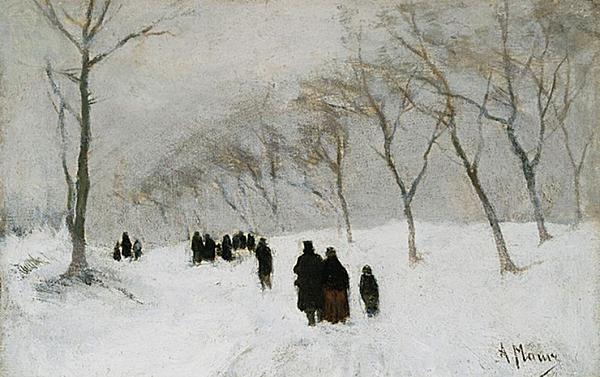
Anton Mauve
d. Feb. 5, 1888
_______________________
The Man Whose Pharynx Was Bad
Wallace Stevens
The time of year has grown indifferent.
Mildew of summer and the deepening snow
Are both alike in the routine I know:
I am too dumbly in my being pent.
The wind attendant on the solstices
Blows on the shutters of the metropoles,
Stirring no poet in his sleep, and tolls
The grand ideas of the villages.
The malady of the quotidian . . .
Perhaps if summer ever came to rest
And lengthened, deepened, comforted, caressed
Through days like oceans in obsidian
Horizons, full of night's midsummer blaze;
Perhaps, if winter once could penetrate
Through all its purples to the final slate,
Persisting bleakly in an icy haze;
One might in turn become less diffident,
Out of such mildew plucking neater mould
And spouting new orations of the cold.
One might. One might. But time will not relent.
_______________________

Nature Morte, ABC
1927
Fernand Léger
b. Feb. 4, 1881
_______________________
The Global Square: an online platform for our movement
A proposal on how to perpetuate the creative and cooperative spirit of the occupations and transform them into lasting forms of social organization.
Reflections on a Revolution (ROAR).....................................................
call and response
Sounds, sights, and stanzas from then and now. An #OWS survey.
triple canopy
_______________________
Beyond SOPA: ACTA, WIPO, and the Global Copyfight
Michael Geist
youtub
Keynote address at the University of South Florida St. Petersburg on January 27, 2012 that discusses the role of digital activism in countering bills like SOPA and the ongoing copyfight over the use of WIPO, ACTA, and aggressive laws to promote restrictive copyright rules.
via Copyfight: the politics of IP
_______________________
Sharing: Culture and the Economy in the Internet Age
Philippe Aigrain
Abstract
In the past fifteen years, file sharing of digital cultural works between individuals has been at the center of a number of debates on the future of culture itself. To some, sharing constitutes piracy, to be fought against and eradicated. Others see it as unavoidable, and table proposals to compensate for its harmful effects. Meanwhile, little progress has been made towards addressing the real challenges facing culture in a digital world. Sharing starts from a radically different viewpoint, namely that the non-market sharing of digital works is both legitimate and useful. It supports this premise with empirical research, demonstrating that non-market sharing leads to more diversity in the attention given to various works. Taking stock of what we have learnt about the cultural economy in recent years, Sharing sets out the conditions necessary for valuable cultural functions to remain sustainable in this context.
OAPEN (Open Access Publishing in European Networks)_______________________
The case for piracy
J. D. Hildebrand
Software Development Times
What if we are looking at this the wrong way. What if, instead of expending their time and energy stopping piracy, copyright holders accepted the pirates as an inevitable, even helpful, part of the creative ecosystem?
A number of researchers, writers, and even copyright holders are starting to come around to this point of view. In increasing numbers, people are sharing their opinion that piracy is a good thing.
How could this be?...(more)
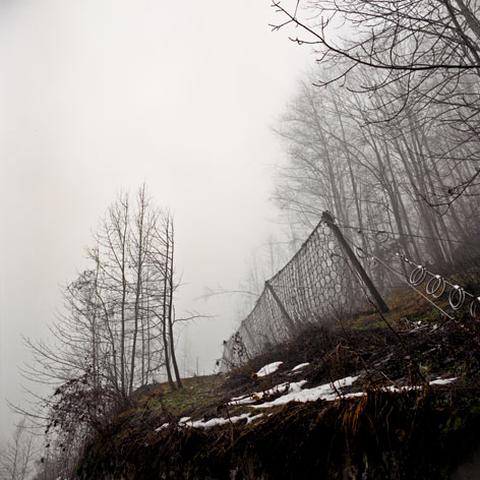
West
Callum Ross
1 2
interview: Callum Ross
small sight
_______________________
On Death, without Exaggeration
Wislawa Szymborska
(....)
Sometimes it isn’t strong enough
to swat a fly from the air.
Many are the caterpillars
that have outcrawled it.
All those bulbs, pods,
tentacles, fins, tracheae,
nuptial plumage, and winter fur
show that it has fallen behind
with its halfhearted work.
Ill will won’t help
and even our lending a hand with wars and coups d’etat
is so far not enough.
Hearts beat inside eggs.
Babies’ skeletons grow.
Seeds, hard at work, sprout their first tiny pair of leaves
and sometimes even tall trees fall away.
Whoever claims that it’s omnipotent
is himself living proof
that it’s not.
There’s no life
that couldn’t be immortal
if only for a moment.
Death
always arrives by that very moment too late.
In vain it tugs at the knob
of the invisible door.
As far as you’ve come
can’t be undone.
...(more)

Wislawa Szymborska
(2 July 1923 – 1 February 2012)
Possibilities
Wislawa Szymborska
Translated by S. Baranczak & C. Cavanagh
(....)
I prefer zeroes on the loose
to those lined up behind a cipher.
I prefer the time of insects to the time of stars.
I prefer to knock on wood.
I prefer not to ask how much longer and when.
I prefer keeping in mind even the possibility
that existence has its own reason for being.
_______________________
Slow Media
Transformations
Issue No. 20 2011
Given the contemporary fascination with and, indeed, addiction to real-time media dispatch and commentary, what does it mean to speak of “slow media”? Is this to invoke the memory of “old” media, of legacy media, the media and technologies that are now thoroughly mediated and remediated into newer, faster, digital forms (Bolter & Grusin)? Or is it to speak of the possibility of experiencing our media more slowly, of taking time out or time off from the email, releasing some of the pressure that has built up in our systems? And dare we even think such a thing when everything around us screams of increased processing speed, increased bandwidth, and increased convergence? We are 24-7, we are always-on, we are connected; we are locatable, we are geotagged, we are Cartesian-coordinated; we are status updated, we are tweet-fed; we are real-time media junkies and everything about our mediascape exists to remind us that we don’t have time to slow down.
Indeed, “slow media” may seem entirely inimical to the age of social media and 24-hour news channels, where we live immersed in a mediascape dedicated to that magical moment “when the interval between the triggering of an event and its processing/reception falls beneath the threshold of sensible perception” (Mackenzie 168). In such a scenario, “slow media” appears either heretical or retrogressive, a wanton disregarding of the patent necessity of instant information dissemination and rampant friending, or just another Luddite reaction-formation.
And yet the term, and concept, has a resonance that is not so easily elided by the familiar narratives of progress and development, and it has taken root in a number of quarters. ...(more)
Digital Suicide and the Biopolitics of Leaving Facebook
Tero Karppi
Slow Play Strategies:
Digital Games Walkthroughs and the Perpetual Upgrade Economy
Daniel Ashton and James Newman
_______________________
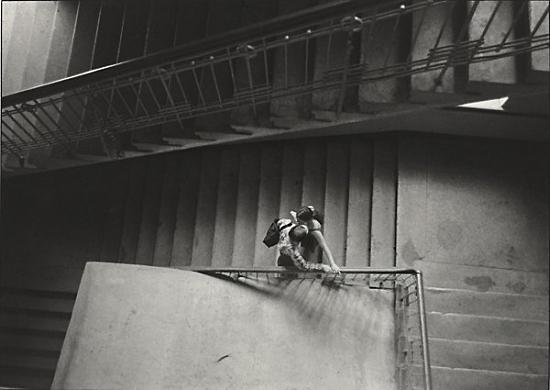
Staircase
Alexander Lapin
1981
Underground:
Russian Photography 1970s-1980s
Nailya Alexander Gallery
via
_______________________
Why I Quit Facebook
Justin E. H. Smith
(....)
I have mentioned that some of my reasons for leaving Facebook have to do with my own personal concerns, my projects and the way Facebook perhaps fails to facilitate them. I also mentioned that in my view Facebook is failing to live up to its potential. Recently, when I looked at my wall, it was as if 'Family Circus', 'Marmaduke', Penny Saver and Reader's Digest were spilling right off of Gutenberg's own press: such a wonderful and promising technology, descended into pure idiocy just after its first appearance in the world.
I have in mind in particular this new innovation, whereby whatever trashy meme some friend (in a highly equivocal sense) deems worthy of liking, ends up in my own newsfeed with the purported explanation that such-and-such friend has just deemed it like-worthy. Thus, after having fought so hard to banish Farmville and Cityville and shit like that from my wall, I was now being bombarded with misspelled slogans insisting that Marilyn Monroe's curves are in fact more beautiful than Lindsay Lohan's skin-and-bones, or that Obama is alright because he fist-bumps janitors, while Romney by contrast likes to get shoeshines on airport tarmacs (something I truly doubt, by the way). And most recently George Takei, likeable enough in himself, has entirely drowned out, with his good-spirited and sassy mash-ups, any possibility of using that social network for that higher aim for which it briefly held some promise: the exchange of well-thought-out ideas.
All the way back in 2007 there was something about this endeavor that rubbed me the wrong way: it was born of the dormitories, and to some extent it draws us all back into them. Or perhaps I should not say 'back': I was a commuter, to a state school, and I lived with my mother. I never lived in a dorm, and I never showed up in a yearbook, to be judged for my hotness or my plainness. The culture that produced Facebook is one that I never knew, and do not like. An image of that culture invaded, and invades, my mind every single time I hear the name of Mark Zuckerberg's venture, and every time I hear the name of Mark Zuckerberg.
I still believe Internet-mediated social networks will prove to be more important in human history than printing presses. But my social network will not be Facebook....(more)
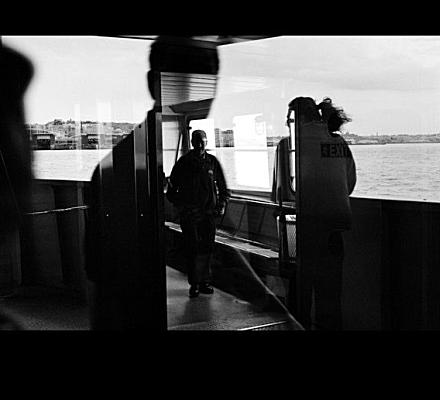
Desperate Intentions
Viviana Peretti
Guernica
Viviana Peretti
_______________________
To saddle me with a lifetime is probably not enough for them: I have to be given a taste of two or three generations. But it's not certain. Perhaps all they have told me has reference to a single existence - the confusion of identities being merely apparent and due to my inaptitude to assume any. If I ever succeed in dying under my own steam, then they will be in a better position to decide if I am worthy to adorn another age (or to try the same one again, with the benefit of my experience). I may therefore perhaps legitimately suppose that the one-armed wayfarer of a moment ago and the wedge-headed trunk in which I am now marooned are simply two phases of the same carnal envelope (the soul being notoriously immune from deterioration and dismemberment). Having lost one leg, what more likely than that I should mislay the other? And similarly for the arms. A natural transition in sum. But what then of that other old age they bestowed upon me (if I remember right), and that other middle age, when neither legs nor arms were lacking, but simply the power to profit by them? And of that kind of youth in which they had to give me up for dead? If I have warm place it is not in their hearts. Oh I don't say they haven't done all they could to be agreeable to me, to get me out of here (on no matter what pretext, in no matter what disguise). All I reproach them with is their insistence. For beyond them is that other who will not give me quittance until they have abandoned me as inutilizable and restored me to myself. Then at last I can set about saying what I was, and where, during all this long lost time. But who is he, if my guess is right, who is waiting for that, from me? And who these others whose designs are so different? And into whose hands I play when I ask myself such questions? But do I, do I? In the jar did I ask myself questions? And in the arena? I have dwindled, I dwindle. Not so long ago (with a kind of shrink of my head and shoulders, as when one is scolded) I could disappear. Soon, at my present rate of decrease, I may spare myself this effort. And spare myself the trouble of closing my eyes, so as not to see the day (for they are blinded by the jar a few inches away). And I have only to let my head fall forward against the wall to be sure that the light from above (which at night is that of the moon) will not be reflected there either, in those little blue mirrors. (I used to look at myself in them, to try and brighten them.)
- Samuel Beckett, The Unnamable
_______________________

Beyond Passaic
a photo essay by Bryan Zanisnik
The Meadowlands cannot be comprehended from a bird's-eye view, nor can it be experienced in a hazmat suit-or even by driving above the wetlands on the Turnpike. One must stay close to the ground and risk exposure to the environment. And so I did, armed with nothing more than a map and a camera.
Triple Canopy
_______________________
The Past Under Erasure? History, Memory, and the Contemporary
Geoff Eley
At the Crossroads of Past and Present - 'Contemporary' History and the Historical Discipline
Edited by: Jan Palmowski and Kristina Spohr Readman
Special Issue: The Journal of Contemporary History
.....................................................
Recent history and the new dangers of politicization
Pierre Nora
Translation by Mike Routledge
eurozine
The positivist tradition of nineteenth century history, dominated by the idea of the nation and based on the archive, began in the 1970s to give way to a concern with recent history, in which the historical witness became paramount. With the past ceasing to be a body of knowledge and becoming a public issue, a new form of political influence has exerted itself upon historians. In the French case, the subject of colonialism is particularly controversial. Now more than ever it is crucial historians retain critical distance.
Reflections on writing historyOmnivore at bookforum
_______________________
Words without Borders
February 2012: International Graphic Novels: Volume VI
_______________________
UbuWeb's Top Ten for February
selected by design critic & author Rob Walker
_______________________
The Sky Is Rising!
Techdirt
For years now, the legacy entertainment industry has been predicting its own demise, claiming that the rise of technology, by enabling easy duplication and sharing -- and thus copyright infringement -- is destroying their bottom line. If left unchecked, they say, it is not only they that will suffer, but also the content creators, who will be deprived of a means to make a living. And, with artists lacking an incentive to create, no more art will be produced, starving our culture. While it seems obvious to many that this could not possibly be true, since creators and performers of artistic content existed long before the gatekeepers ever did, we've looked into the numbers to get an honest picture of the state of things. What we found is that not only is the sky not falling, as some would have us believe, but it appears that we're living through an incredible period of abundance and opportunity, with more people producing more content and more money being made than ever before. As it turns out... The Sky Is Rising!
With A Little Help: Digital Lysenkoism
DRM, “social DRM,” and the madness of publishers
Cory Doctorow
(....)
It’s one thing to have your publisher’s bizarre, ideology-driven superstitions erode e-book sales. It’s quite another to learn that you’re going to miss out on a chance to pay off your mortgage because your publisher has bought into a form of digital Lysenkoism.
(....)
... we know that customers hate DRM. They rail against it, they actively seek out non-DRM versions, and they boycott products with DRM platforms. In publishing, there’s the dawning realization that allowing, say, Amazon, to lock up your books with its DRM means that Amazon essentially owns your customers. That is the reality of DRM. This is incredibly bad for publishing’s future.
Still, in many publishing boardrooms, executives cling to their Lysenko-like belief in DRM, while on the lower floors, digital strategists, editors, and production staff all know exactly how bad DRM is for business....(more)
_______________________

Westport
photo - mw
|

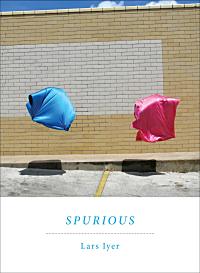


 The Age of Briggs & Stratton
The Age of Briggs & Stratton



























